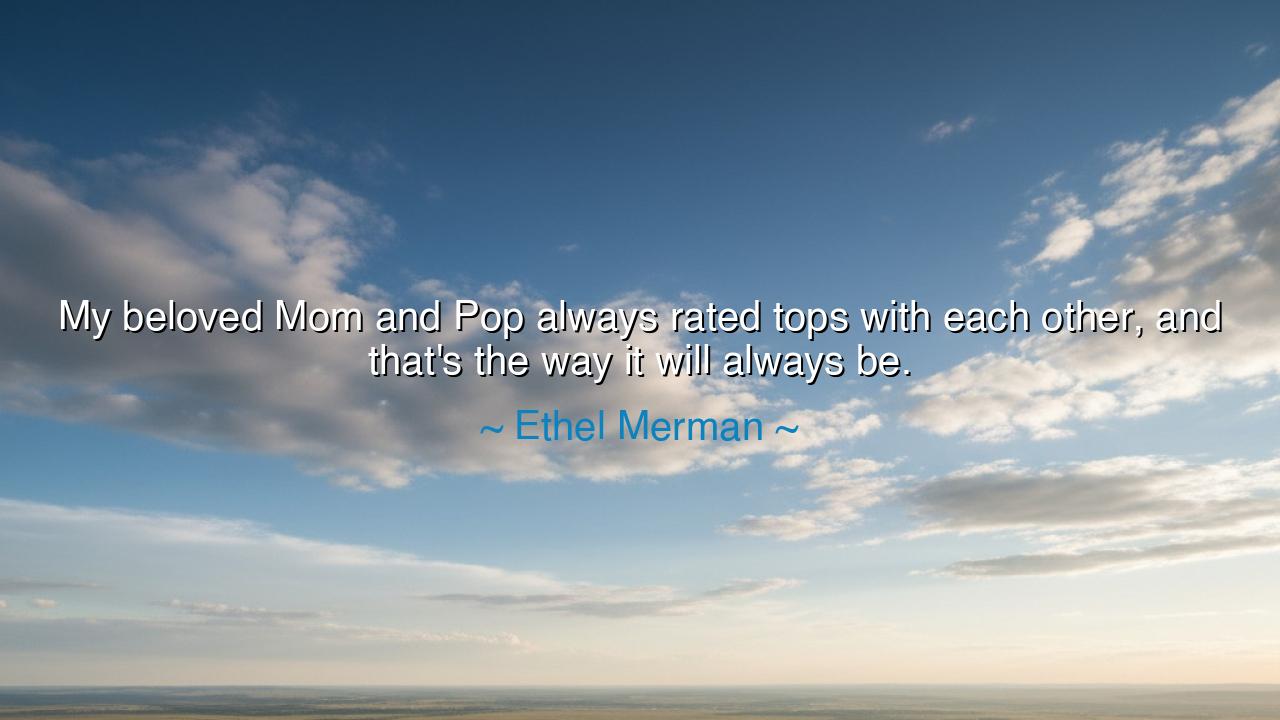
My beloved Mom and Pop always rated tops with each other, and
My beloved Mom and Pop always rated tops with each other, and that's the way it will always be.






“My beloved Mom and Pop always rated tops with each other, and that’s the way it will always be.” — Ethel Merman
In this warm and tender remembrance, Ethel Merman, the great voice of the American stage, offers not merely a statement of affection but a timeless reflection on love, loyalty, and the sacred harmony of family. Her words, “My beloved Mom and Pop always rated tops with each other,” paint the portrait of a home bound by devotion, a union where mutual respect was not fleeting but eternal. Beneath the simplicity of her phrasing lies the heartbeat of something eternal — the enduring strength of two souls who stood as one against the changing tides of life.
To the ancients, such a bond would have been considered holy. The Greeks called it philia, the deep friendship that underlies true love — the steady flame that endures beyond passion’s first fire. The Romans honored it in their household gods, believing that when two hearts were united in fidelity and understanding, their love became a guardian spirit for generations to come. When Merman speaks of her parents as “always rating tops with each other,” she describes this sacred symmetry — not the perfection of flawless lives, but the perfection of mutual devotion. In their steadfastness, her parents reflected the divine order that the ancients saw as the root of all peace: two people in balance, giving and receiving in harmony.
Ethel Merman, born into a humble Brooklyn home, rose to stardom through force of will and voice — but it was the quiet strength of her parents that built the foundation on which she stood. Her mother, a teacher of dignity and care; her father, a steady presence of discipline and humor. Their relationship was not gilded by wealth or fame, but by affection and endurance — qualities forged in the furnace of shared hardship and joy. In them, she witnessed the model of true partnership, the kind that neither envy nor adversity could corrupt. And so she immortalized their love in this simple, heartfelt tribute, as though to say: What I am, I owe to the harmony I beheld in them.
The ancients told stories of couples whose devotion defied even death — Baucis and Philemon, for instance, who welcomed gods disguised as travelers when all others turned them away. For their kindness and unity, they were granted a blessing: that they should die together, transformed into two trees with branches forever entwined. So too, Merman’s parents embody that same spirit — a love not confined to time or flesh, but one that becomes part of the eternal order. “That’s the way it will always be,” she says — as if to declare that love, once true, never dies; it only changes form.
Her words remind us, too, that the strength of a family begins with the love between its parents. When two people honor each other, they create not only a home but a world — a small cosmos of faith and safety in which children learn what it means to love, to trust, to persevere. The ancients saw this as the foundation of civilization itself. The home was the first temple, the family the first nation. And when that foundation is sound, the generations that follow rise strong and rooted. Merman’s gratitude, wrapped in nostalgia, speaks to this eternal truth: her parents’ unity shaped her own strength, their affection became her compass through fame and adversity alike.
There is also something profoundly heroic in constancy. In a world that prizes novelty and movement, Merman’s parents stood firm. Their love was not the fleeting flame that dazzles and fades, but the steady hearth-fire that warms all who gather near. To “rate tops” with one another is to place the other always above the self — to see not one’s own reflection in a partner, but the sacred otherness that makes love holy. This is not weakness, but power — the power of humility, of respect, of choosing each other every day. The ancients might have called it areté, excellence of the soul, expressed through devotion.
Let this be the lesson we draw from her words: honor the bonds that endure. In an age of distractions and fleeting ties, remember that the truest strength lies in steadfast affection. If you love, let your love be faithful; if you serve, let your service be joyful. Nurture the relationships that uplift you, for they are the ground upon which your destiny stands. As Ethel Merman’s parents “always rated tops” with one another, so too should we strive to live in such balance — loving not for advantage, but for the quiet glory of the heart.
And so, as the ancients would say: A home ruled by love becomes a fragment of paradise. Merman’s words remind us that greatness begins not on the stage or in the marketplace, but in the humble, unseen exchange of devotion between two souls. Her parents’ love — simple, strong, unwavering — became the melody of her life. And through her, their harmony still resounds, teaching us that love, once true, endures forever.






AAdministratorAdministrator
Welcome, honored guests. Please leave a comment, we will respond soon